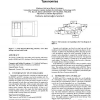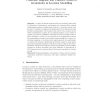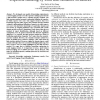988 search results - page 19 / 198 » SenseNet: A Knowledge Representation Model for Computational... |
ER
2006
Springer
13 years 11 months ago
2006
Springer
Ontologies on the Semantic Web are by nature decentralized. From the body of ontology mapping approaches, we can draw a conclusion that an effective approach to automate ontology m...
WWW
2004
ACM
14 years 8 months ago
2004
ACM
We present a method for representing and reasoning with uncertainty in RDF(S) and OWL ontologies based on Bayesian networks. Categories and Subject Descriptors: I.2.4 Artificial I...
SCP
1998
13 years 7 months ago
1998
A central challenge in computer science and knowledge representation is the integration of conceptual frameworks for continuous and discrete change, as exemplified by the theory ...
KI
2010
Springer
13 years 6 months ago
2010
Springer
Location models are data structures or knowledge bases used in Ubiquitous Computing for representing and reasoning about spatial relationships between so-called smart objects, i.e....
SOCIALCOM
2010
13 years 5 months ago
2010
We developed user models of knowledge exploration in a social tagging system to test the expertise rankings generated by a link-structure method and a semantic-structure method. Th...



